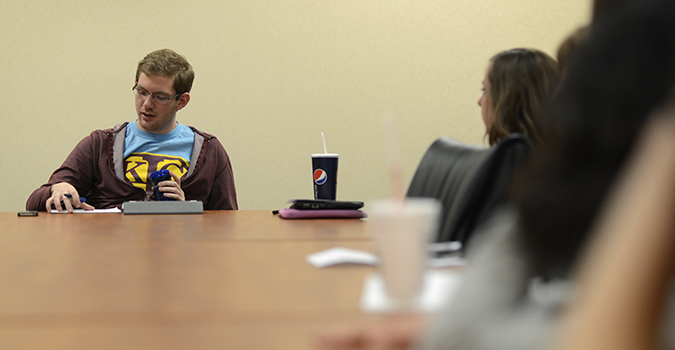Breaking the taboo: Sexual health
Senior spanish major Tom Ream speaks to fellow members of Kent State organization FACE AIDS during a meeting on the third floor of the student center on Wednesday, April 3. Photo by Jenna Watson.
In 2007, graduate student Heather Pavlich surveyed 421 Kent State students from randomly selected classes to receive their input on matters related to sex and sexually transmitted diseases.
Of the students surveyed, Pavlich found only 30 percent of sexually active students on campus used protection in the form of condoms.
While this study was a small sampling and does not necessarily represent the student body accurately, the question remains: Are students educated about the risks of STDs?
Free HIV testing
To schedule an appointment for free HIV testing or find answers to questions relating to sexual health, call the Office of Health Promotion at (330) 672-2320.
“I don’t think [sex education] is in college quite as much as it is in high school, that’s for sure,” said Lisa Conrad, junior fashion design major. “I know a lot of my friends — and it bothers me to no end — they don’t use condoms, and they just don’t care. You push them to go get tested, there are flyers all over campus that say when it is, and they just won’t go. They get scared.”
In 2006, more HIV infections occurred among adolescents and young adults aged 13 to 29 than any group. By 2007, 25,036 young people in the U.S were living with HIV, according to the Foundation for AIDS Research.
Of the 1.7 million people living with HIV in the U.S., 20 percent is unaware they are infected, according to AIDS.gov.
Members of Kent State’s FACE AIDS, a branch of a national youth movement dedicated to raising money and awareness for AIDS in Rwanda, said the sheer abundance of student misinformation running rampant on campus is both frustrating and frightening.
Tom Ream, president of Kent State’s chapter of FACE AIDS, said a lot of the misinformation and hesitation about discussing STDs comes as a result of our culture. Even at a young age, sex isn’t something people want to talk about — it’s something of a taboo even today, Ream said.
“There are times where if I tell someone I’m the president of FACE AIDS, people will immediately shut down and walk away because they just don’t want to talk about anything related to it,” Ream said. “We’ll see people go out of their way to avoid the tables because they don’t want to walk past a table full of condoms.”
Jazzminn Brown, junior public health major, said she noticed some people throughout campus are under the perception that one-trick rules to curing or preventing STDs exist.
“I’m looking at the science behind it and seeing how misinformed people are, and I notice a lot of it is from the Internet,” Brown said.
Students have had different experiences with sex education in high school, but many claim they received little to no information before college. Those who did found it confusing and convoluted.
Sierra Baker, a graduate student studying health education and promotion, had a particularly memorable experience with a high school health class when an athletic director filled in for the instructor.
“She passed out a piece of gum, had us chew the gum, and then we took the gum out and she said, ‘this is your virginity. Do you want to give your partner this clean, nice piece of gum in this fresh wrapper, or this, like, sticky, chewed up piece of whatever,’” Baker said. “That’s, literally, the only thing I remember from that class.”
Danielle Melidona, junior communication studies major and vice president for programming and development for Kent Interhall Council, organized Kent’s annual “Sex Week” last semester.
She said she thinks the university offers a significant amount of resources for students looking to ask questions about STDs, but the ultimate decision lies in the hands of the individual.
“Students need to be more willing and open to it,” Melidona said. “The health center offers free testing. Students may be embarrassed to take advantage of that, but it is a great resource, and they’re able to answer a lot of questions.”
Ream said FACE AIDS, in collaboration with other organizations on campus, hosts numerous educational events to raise awareness and trigger conversations about sex.
“We have a whole evening dedicated to the ladies,” Ream said, “and we talk about the issues that they have and ways to promote their own sexual health.’
Resident assistants also actively work to keep the spotlight on the issue. Melidona said the reason she was so interested in organizing “Sex Week” was its ability to attract students.
“While it is something fun and grabs people’s attention, I think it is important to maximize that attention and to present educational information regarding different facets of sex,” Melidona said. “I think students think that they know about STDs and STIs, but until they actually go out and seek proper resources on our campus, they might not.”
Brown suggested a shift in the focus of the HIV/AIDS discussion, asking that people stop constantly citing statistics and start showing how the disease operates.
“I think it really hit me when we had to see step-by-step what HIV does to your body and how,” Brown said.
Melidona suggested that anyone who is embarrassed or afraid to ask questions or get tested should seek the comfort of a friend he or she trusts to come along.
“I think if you talk to a friend about it, you’ll be more comforted when you are talking to a professional about it as well,” Melidona said.
Contact Christina Suttles at [email protected].



